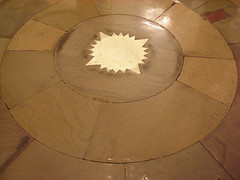I drove home from our state edtech conference earlier this week with lots of ideas, questions and conflicts. Nothing new there.
But one of those questions has been stuck in my head for a while: Are “tech” conferences like VSTE really necessary anymore?

Adding to the conflict was a recent tweet from Jon Becker suggesting a conference merger between the Virginia affiliates of ASCD and ISTE.
He has a good point. VASCD could probably use a good dose of technology and grassroots social networking (as opposed to the manufactured version used by many organizations and most corporations).
And VSTE’s conference needs more focus on instruction and less on scattershot dispersal of tips/tricks/apps of the kind we saw in the closing keynote.
However, edtech conferences like ours (and the giants like ISTE and FETC) are only part of the problem. For the most part, their programs are very much reflective of the way technology is still used in most schools.
Despite decades of spending on “educational” computing and talk of web 2.0/21st century skills, actually using all that technology is still optional. For most administrators and teachers – and students for that matter – it is not an essential part of the school learning process.
Thus we have conferences about education separate from those about technology in education.














